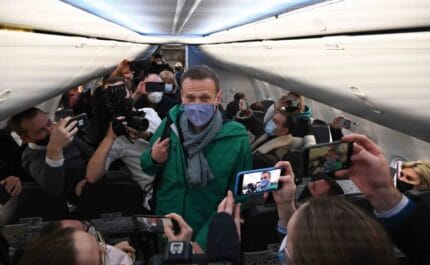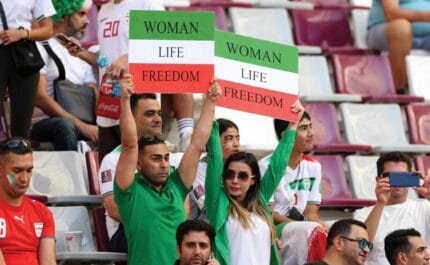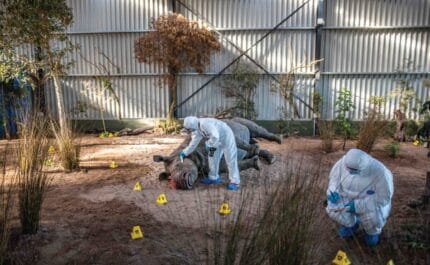Moment that mattered: The murder of Boris Nemtsov
On 27th February 2015 the Russian politician and opposition campaigner Boris Nemtsov was assassinated, gunned down as he crossed the Bolshoy Moskvoretsky Bridge in the shadow of the Kremlin. In DG #18 we spoke to Bill Browder, a US-born British financier whose own brush with political murder in Russia brought him into contact with Nemtsov – and put him on Vladimir Putin's list of enemies
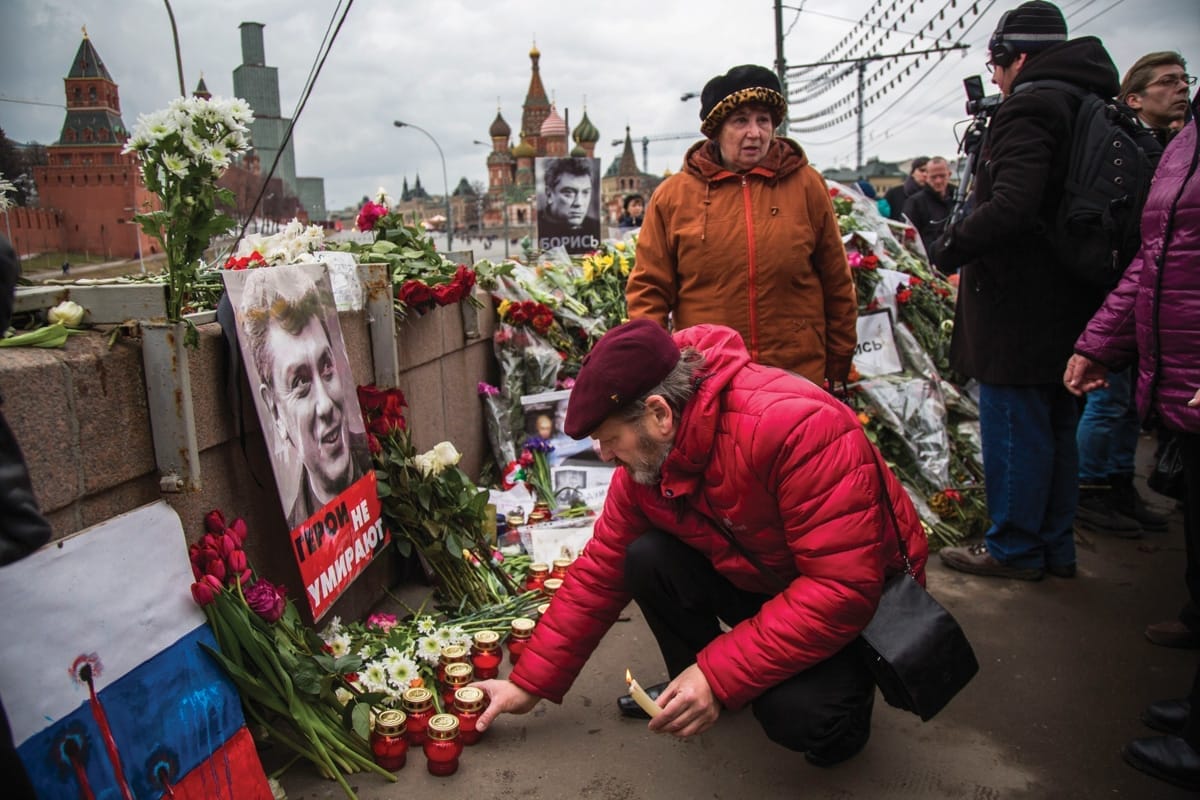
Photo: Alexander Zemlianichenko / AP / PA Images
27th February 2015 (Taken from: #18)
“Boris Nemtsov was a genuine man of principle. If something was morally wrong it affected him in a visceral way. In the 1990s he was deputy prime minister of Russia. Everyone else who has held that post went on to become a billionaire, some multi-billionaires. Nemtsov went in a different direction. Instead of taking the money he chose a life of abject misery that ultimately ended in him being shot for his principles. There’s no better definition of a hero than a person who chooses to forgo everything, including his life, for what he believes.
What happened to Nemtsov fits into the whole character of how dissent has been dealt with during Putin’s time in power. The most important person in any particular group seen as troublesome is picked and something is done to make an example out of them. The result is that everyone else cowers in fear. Mikhail Khodorkovsky, once the richest oligarch in Russia, was arrested and his trial was televised, showing him locked in a cage. The investigative journalist Anna Politkovskaya was assassinated. And it happened to me, the loudest voice in the investment community.
I was the largest foreign investor in Russia between 1996 and 2005. I was running an investment firm, Hermitage Capital Management, and I started to see huge amounts of corruption in the companies I was investing in. The theft was so extreme I felt I had to do something. So I researched how criminal gangs stole from large companies and publicised that research through international media. This upset people and in 2005 I was expelled from Russia and declared a threat to national security.
I liquidated all of my company’s holdings in Russia and evacuated all my staff out of fear for what might happen next. I kept the offices in case the government relented, but I thought I was done with Russia. In June 2007, police officers raided my Moscow office and the Moscow offices of my law firm. All of our corporate documents were seized. The next thing we knew, we no longer owned our investment companies. They’d been fraudulently transferred using the documents seized by the police and were now registered in the name of a convicted murderer.
At this point I went and hired the smartest lawyer I knew in Moscow, Sergei Magnitsky. He believed there were two objectives to this crime. The first was to steal all of the money in the companies – which they didn’t succeed in doing, as there was nothing left after the liquidation. The second was to steal all the taxes that we’d paid to Russia the previous year. During liquidation my company had paid over $230 million in taxes. The new owners of the companies applied for a tax refund of all $230 million. They applied for it on 23rd December 2007 and it was awarded and paid out one day later, on Christmas Eve. It was the largest tax refund in the history of Russia.
At that point I still assumed that Putin was a nationalist. How could he tolerate the theft of nearly a quarter of a billion dollars from the Russian people? So Sergei and I thought if we were to expose this crime to all the senior law-enforcement officials in Russia and publicise it in the media then Putin, being a nationalist, would go after the bad guys who were stealing from the Russian people.
We waited for the good guys to come and get the bad guys, but what we didn’t realise was that in the Putin regime there are no good guys”
We wrote criminal complaints to every different law-enforcement agency in Russia and we publicised them. Sergei testified against the officials involved and we waited for the good guys to come and get the bad guys, but what we didn’t realise was that in the Putin regime there are no good guys. Instead of being investigated, the people who Sergei testified against came to his home at 8am on 24th November 2008 and arrested him.
He was put in pre-trial detention where he was tortured. They put him in cells with 14 inmates in eight beds and left the lights on 24 hours a day. They put him in cells with no heating and no windows in December in Moscow so he nearly froze to death. They put him in cells with no toilets, just a hole in the floor.
The purpose of all this mistreatment was to get him to withdraw his testimony against the police officers and sign a confession saying that he had stolen the $230 million and done so on my instructions. But Sergei turned out to be a man of incredible principle. No matter how much physical pain he endured, the moral pain of bearing false witness was too much for him and he repeatedly refused. After six months he had lost 20 kilos and was diagnosed as having pancreatitis and gallstones. An operation was scheduled for November 2009.
About a week before his operation they moved him to a prison without a hospital and denied him all medical attention. He was in constant agony and 20 written requests for medical attention were rejected.
On the night of 16th November 2009 he went into a critical condition. That night the authorities transferred him to a prison with a hospital, but instead of putting him in the ER, they put him in an isolation cell, chained him to a bed and eight riot guards with rubber batons beat him to death. I found out the next morning and it was the most horrifying, traumatic, life-changing news I have ever received. I made a vow to his memory, his family and myself that the people who killed him would face justice.
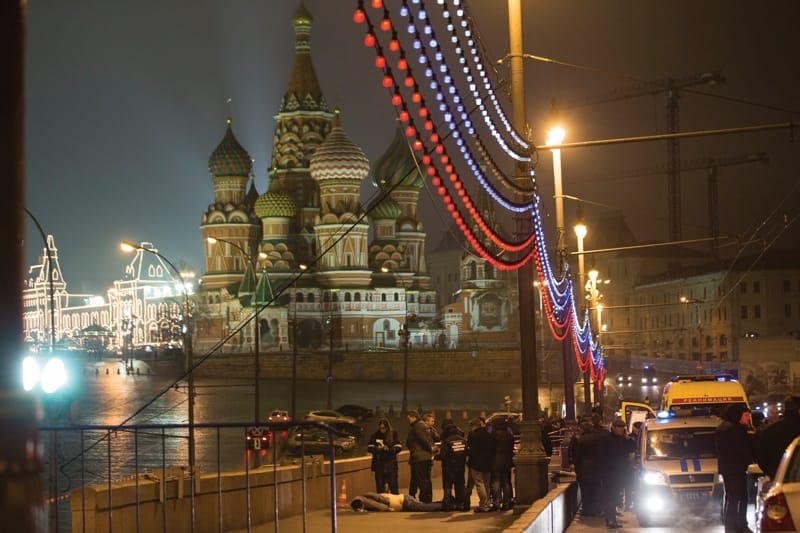
Russian police with the body of Boris Nemtsov shortly after he was shot in the back four times in view of the Kremlin. Photo: Pavel Golovkin / AP / PA Images
Boris Nemtsov joined this fight. I never asked him for help, but he volunteered and started campaigning for justice for Sergei and for sanctions to be imposed by the West on the people that killed him. Nemtsov described sanctions as the Achilles’ heel of the Putin regime and that’s exactly right. If you go back 30 or 40 years to when the Soviet Union was run by the Politburo they were at odds with the West, and the leverage we had over them was relatively limited because they were all living and operating inside the Soviet Union.
The Putin regime does just as nasty things but it does them for enrichment and to fund a Western lifestyle. They don’t keep their money in Russia, they keep it and spend it in the West. Their desire to come to London, the south of France or New York City opens them up to huge leverage from the West. We ended up getting the US government to pass the Magnitsky Act [barring Russian officials believed to be involved in the death of Magnitsky from entering the US or using its banking system].
Sergei once told me that that Russian stories don’t have happy endings”
Europe is the big prize, though. For every Russian that goes to America there are 20 that go to Europe. If you’d asked me if there was a chance of getting the EU to sign up to sanctions against individuals before the invasion of Ukraine I’d have said it would be a hard sell because of the disparate nature of decision-making in the EU. But now sanctions have been imposed for Russia’s actions outside of Russia, it’s an easier sell to argue that we should also impose sanctions for how they mistreat people inside their own country.
Although sanctions help, only the Russian people can take down Putin’s regime. The regime is doing everything possible to suck the oxygen out of the opposition. However, the economy is now in a state of massive deterioration. As things get worse and the repression increases there’s going to be a tipping point. I think it’s going to end with the Russian people saying enough is enough, and it will probably be violent. Putin understands that. For him, staying in power is imperative; a quiet luxury retirement isn’t on the cards.
Of course I fear for my own life. If the Putin regime wants me dead, I believe it can make that happen, but I don’t have any choice. I couldn’t walk away after they killed Sergei. I wouldn’t have been able to live with myself. In trying to get justice for him, I’ve created a series of outcomes. Everything’s connected. Boris Nemtsov turns up to fight for justice for Sergei – and it was one of the most significant irritants he generated for the Putin regime. After doing so he gets killed. So now we have a duty to fight for Boris Nemtsov too. Sergei once told me that that Russian stories don’t have happy endings. At the moment it seems that’s true.”
Slow Journalism in your inbox, plus infographics, offers and more: sign up for the free DG newsletter. Sign me up
Thanks for signing up.
